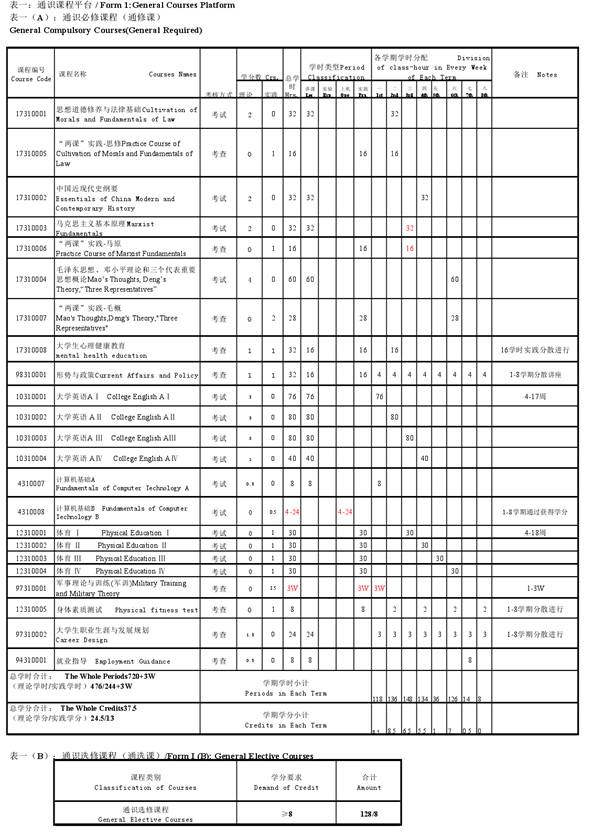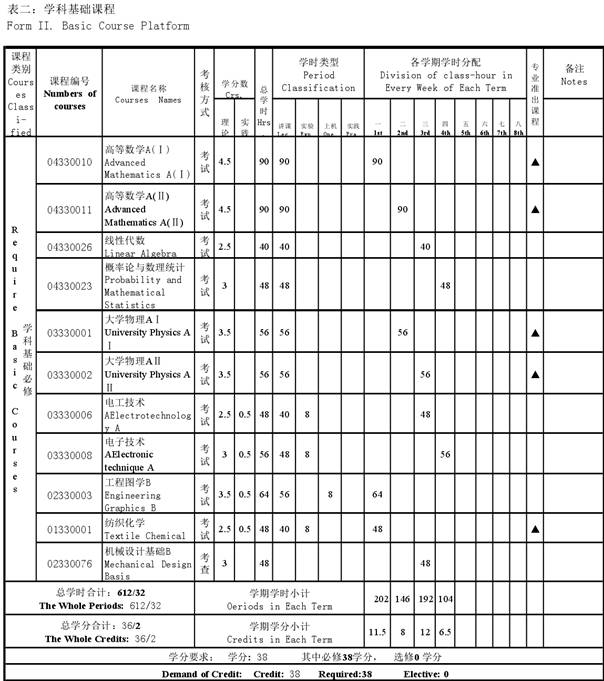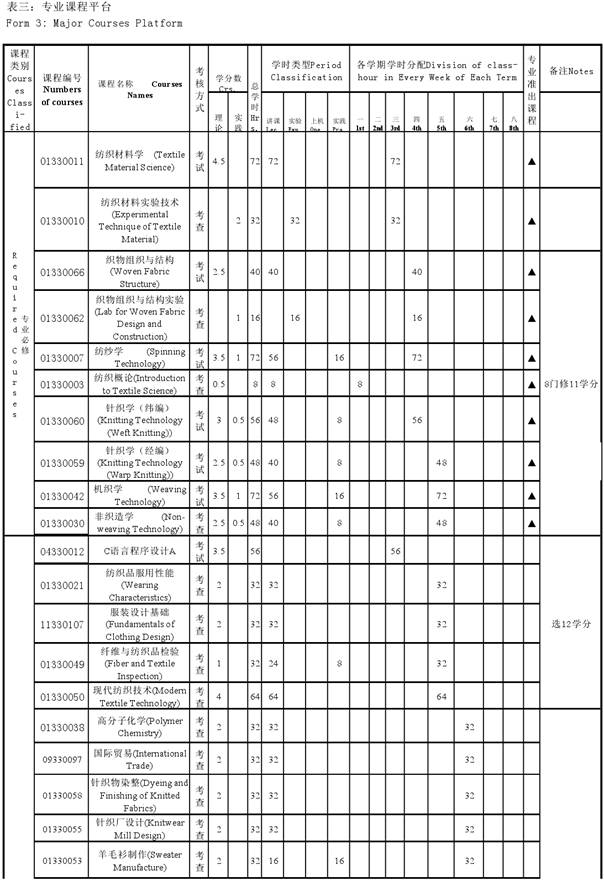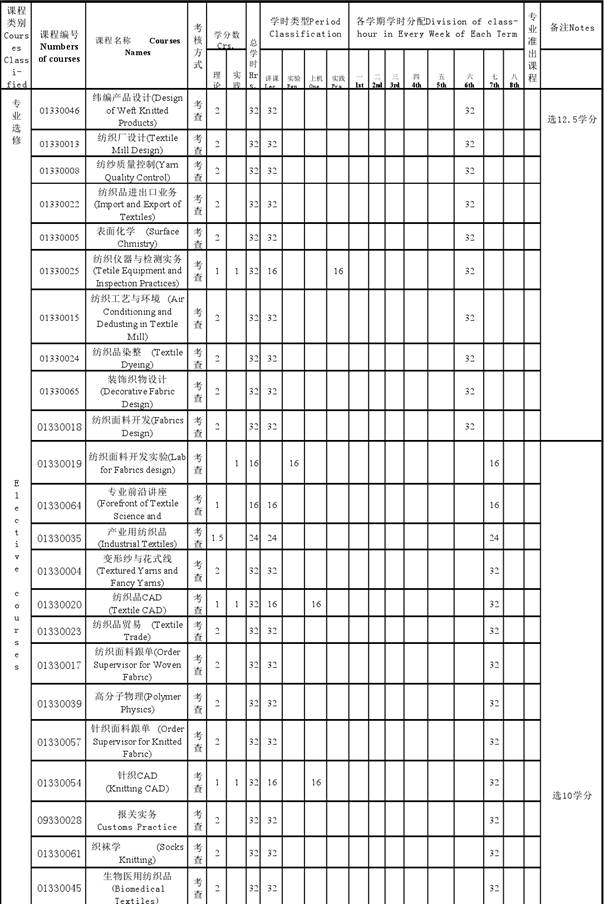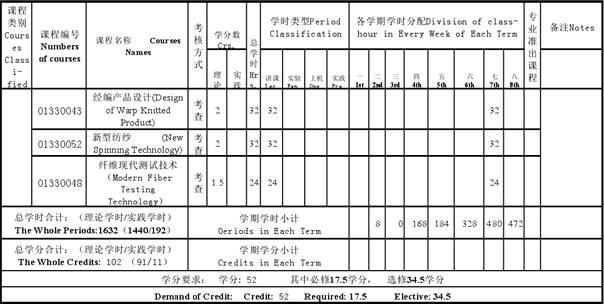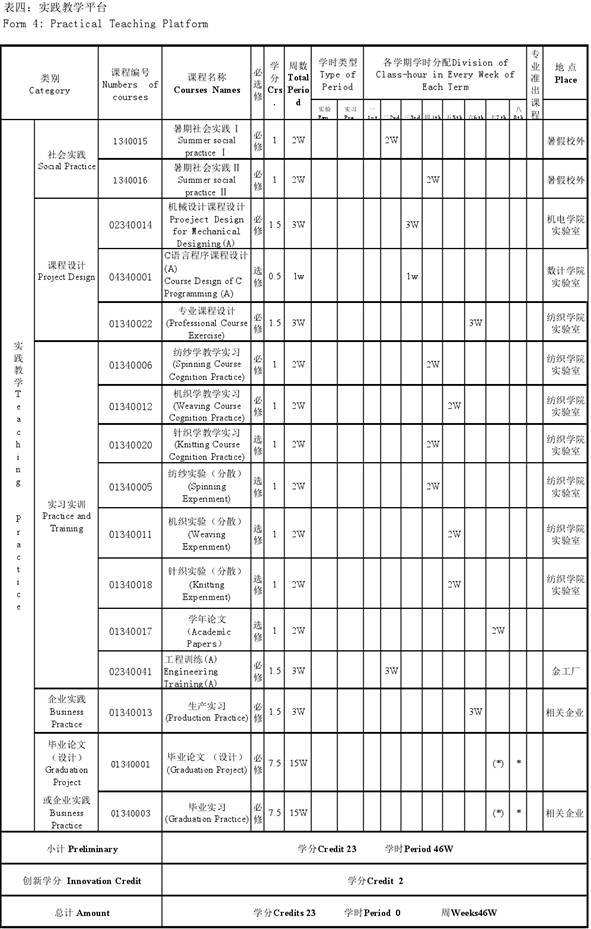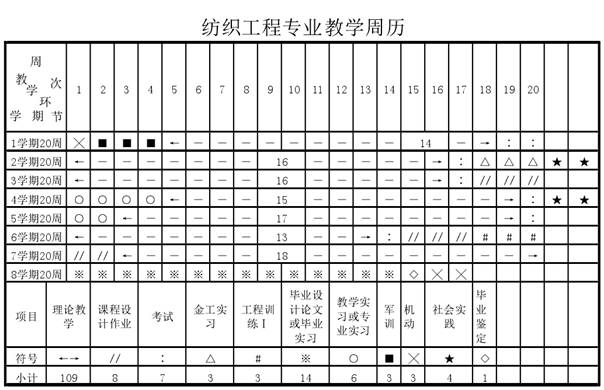纺织工程专业本科培养方案
Undergraduate Program for Textile Technology and Engineering
一、专业代码
081601
I、Major Code
081601
二、培养目标
本专业培养具备“知识、能力、品格”协调发展,适应纺织学科与材料、信息、机电、环境、管理、艺术、贸易营销等学科融合发展的趋势,具有创新意识、实践能力和国际视野,全面掌握纺织工程领域的知识和技能并在纺织领域某一方向具有专长,能在纺织企业或研究机构从事纺织新技术研究、多功能纺织品开发和纺织工艺设计、生产管理、商务经贸等方面工作的高级应用型创新人才。
II、Cultivation Objectives
The undergraduate (B.E) course in Textile Technology & Engineering aims to endow students with the capability of “Knowledge, Ability, and Character”, make students adapt to the developing trend of various subjects, such as textile science and materials, information technology, mechatronics, environment, management, arts and marketing, et al., and improve their sense of creation, practical ability and international perspective. The graduates of this major are expected to be competent in the field of textiles and having the capability to deal with works related to textile research and development, textile product design, textile manufacture and management, business and marketing, etc
三、基本要求及特色
1、基本要求
本专业学生主要学习纺织类专业的基本理论和专业知识,接受工程实践和科学研究的基本训练,系统地掌握纺织产品的生产原理与制造技术、设计与开发方法,了解纺织产品的生产及质量管理方面的内容,并具备纺织科学研究及市场开拓的基本能力。
1.1 知识要求
(1)掌握相关的人文社会科学、自然科学基本知识和科学方法以及一定的经济管理知识,并能用于指导未来的学习和工程实践。
(2)掌握工科的公共基础知识与实验技能。
(3)掌握纺织纤维及纤维集合体的形貌、结构、性能,熟悉相互间的关系规律。
(4)掌握纺织产品加工技术的基本原理,纺织产品工艺流程、纺织产品工艺参数制定等基本知识,熟悉通用纺织设备的工作原理。了解染整和非织造方面的基本知识,了解纺织专业的发展现状和趋势。
(5)掌握纺织产品的基本性能评价指标和相应的检测方法。
(6)掌握纺织产品组成和结构分析、纺织产品设计的基本知识。
(7)熟悉纺织产品制造的工程实践知识。
(8)了解国际国内对于纺织类企业管理、纺织产品质量标准、纺织流通领域等方面的方针、政策和法规。
1.2 能力及素质要求
(1)具有使用纺织检测仪器测试纺织产品主要性能指标的能力。运用纺织专业理论知识和技能分析纺织产品的组成、结构和制造方法的能力。具备从事生产管理、市场预测和商品贸易的基本能力。
(2)具有正确应用纺织专业理论和知识合理选择纺织产品的工艺路线和主要工艺参数的能力,具有正确分析纺织产品质量问题的能力。
(3)具有制定纺织实验方案、开展实验、分析结果、总结归纳或做出结论的能力。
(4)具有较强的创新意识和工程实践能力,掌握从事科学研究工作的基本方法,具备科学研究的初步能力。
(5)具有学科知识综合能力,具有纺织新产品、新工艺、新技术开发的初步能力。
(6)具有较好的组织管理能力、较强的交流沟通、环境适应和团队合作能力。
(7)具备从事生产管理、市场预测和商品贸易的基本能力。
(8)具有信息管理能力,具备较好的应用信息技术获取新知识与相关信息的能力和较强的自主学习能力。
(9)熟悉文献检索的基本方法,具有阅读专业文献以及搜集、整理、分析专业相关文献的能力。
(10)具有应用一门外语查阅专业文献和进行交流的能力, 具有一定的国际视野和跨文化环境下的交流、竞争与合作的初步能力。
(11)具有现代工程技术人员必需的职业道德、强烈的社会责任感和丰富的人文科学素养。
(12)具有良好的质量、环境、职业健康、安全和服务意识。
(13)具有应对危机与突发事件的初步能力。
2、特色
本专业采用纺织行业重大科技创新成果,科学构建学生所学的机械加工材料成型方面的知识体系;以纺织毕业论文为载体,实施企业和学校双向导师指导,培养学生进入到企业所需的技术研究和工程实践能力;毕业生能承担纺织企业中的与纺织工艺有关的技术工作并具有纺织材料方面的优势。
Ⅲ、 Basic Requirements and Program Features
1 Basic Requirements
Students who study Textile Technology & Engineering will learn basic theories and specialized knowledge of textiles; get training on engineering practice and scientific research of textiles; master the knowledge of textile product design and manufacturing systematically. You will also learn the basic management skills for the textile industry markets.
1.1 Studying Requirements
(1)master the basic knowledge of humanities and social science, natural science, scientific methods and economic management, which will be employed to guide the textile production practice
(2)master the basic knowledge and experimental skills of engineering discipline.
(3)master the morphology, structure, properties of fiber & fiber assemblies and familiarize with their inter-relationship.
(4)master the basic principle, process and parameters of textile fabrication, familiarize with operating principle of conventional textile equipment, know the basic knowledge of nonwoven and current development state and prospect of textile.
(5)master the quality indicators and testing methods of textile properties.
(6)master the composition, structure and design basic knowledge of textile products.
(7)master the engineering practice knowledge of textile products.
(8)know national & international standards & regulations on control and material flow in the supply chain, business management, quality, circulation domain of textile.
1.2 Ability Requirements
(1)ability to test the major properties of textile products and work in production management, market forecast and trading of textile.
(2)ability to choose proper process route and parameters, informed by textile professional theory and knowledge and to analyse the quality problems of textile products.
(3)ability to formulate plan, develop experiments, analyse results and summarize conclusions of textile experiment.
(4)ability to innovate and adopt engineering practice, master the basic approach of scientific research.
(5)ability to synthesize knowledge, develop novel product and process.
(6)develop good organizational, management, communication, and teamwork skills.
(7)ability to work in production management, market forecast and trading of textile.
(8)ability in information management, acquiring new knowledge, self-directed learning.
(9)familiarize with basic path of literature search, ability to read, sort out and analyse literature of textile related materials.
(10)ability to search, read and write documents in one foreign language use a foreign language to communicate in competition and cooperation under an international and cross-cultural environment.
(11)have the necessary professional conduct, a strong sense of social responsibility and humanity.
(12)have good awareness of quality, environment, occupational health and safety (OHS).
(13)ability to handle crisis and complicated emergency.
2 Program Features
Students’ knowledge system will be constructed from important textile scientific and technological achievements; develop the students’ ability of technology research and engineering practice by practical engineering project as the carrier and employing enterprise and school as double mentor. Graduates have advantages of textile materials and ability to take technical work related to the textile processing of textile enterprises.
四、专业准入课程标准
高等数学A(Ⅰ)、高等数学A(Ⅱ)、大学物理AⅠ、大学物理AⅡ、纤维化学。
Ⅳ、Professional access course standards
Advanced Mathematics A(Ⅰ)、Advanced Mathematics A(Ⅱ)、College Physics A(I)、College Physics A(Ⅱ)、Fiber Chemistry.
五、专业准出课程标准
① 纺织材料学、纺织材料实验技术 ② 织物组织与结构、织物组织与结构实验 ③ 纺纱学 ④ 针织学(纬编)、针织学(经编)⑤ 机织学、⑥ 非织造学(6门课程修11学分)。
Ⅴ、Professional out course standards
①Textile Material Science、Textile Material Experiment Technology ② Woven Fabric Structure、Woven Fabric Structure Experiment ③ Spinning Technology ④ Knitting Technology(weft knitting)、Knitting Technology (warp knitting) ⑤ Weaving Technology ⑥ Nonwoven Technology(With 11 credits in 6 courses).
六、实践性教学环节
军训、社会实践、专业课程实验、纺织现场教学实习、工程训练I、生产实习、学年论文、机械设计课程设计、专业课程设计、毕业设计(论文)或毕业实习。
Ⅵ、Practical Teaching Taches
Military Trainning、Social Practice、Professional Course Experiment、Professional Course Cognition Practice、Engineering training I、Production Practice、Academic Papers、Course Exercise of Mechanical Design、Professional Course Exercise、Graduation Practice or Graduation Practice.
七、毕业合格标准
本专业学生在校期间必须修满课程教学和集中实践160学分和素质拓展10学分方能毕业。(其中创新学分与实践选修学分或专业选修学分可以互换)
Ⅶ、Graduation Eligibility
Students of this speciality can only be qualified to graduation after the completion of 160 credits (course learning and practical training) and 10 credits of quality expansion. (Innovative credits and speciality elective credits are interconvertible.).
八、学制与学位
修业年限:4年
授予学位:工学学士学位
Ⅷ、Length of Schooling and Degree
Duration: 4 years.
Degrees conferred: Bachelor of Engineering.
九、学时与学分
Ⅸ、Hours/Credits
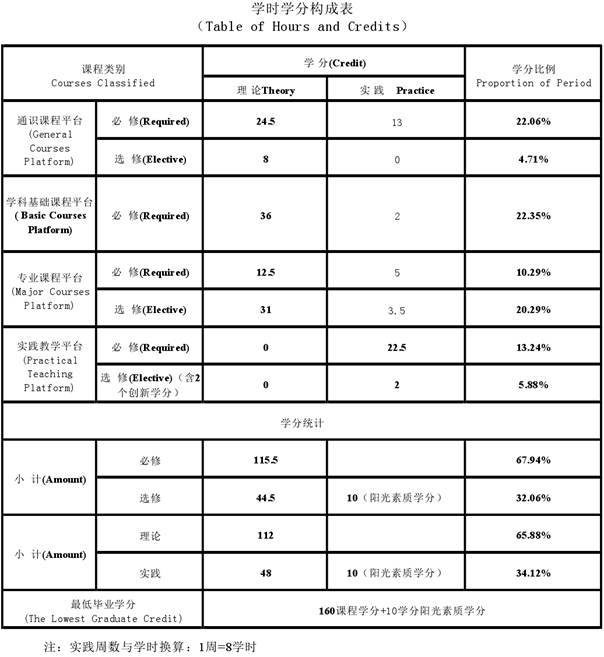
十、教学进程计划表
Ⅹ、Teaching Schedule Form
